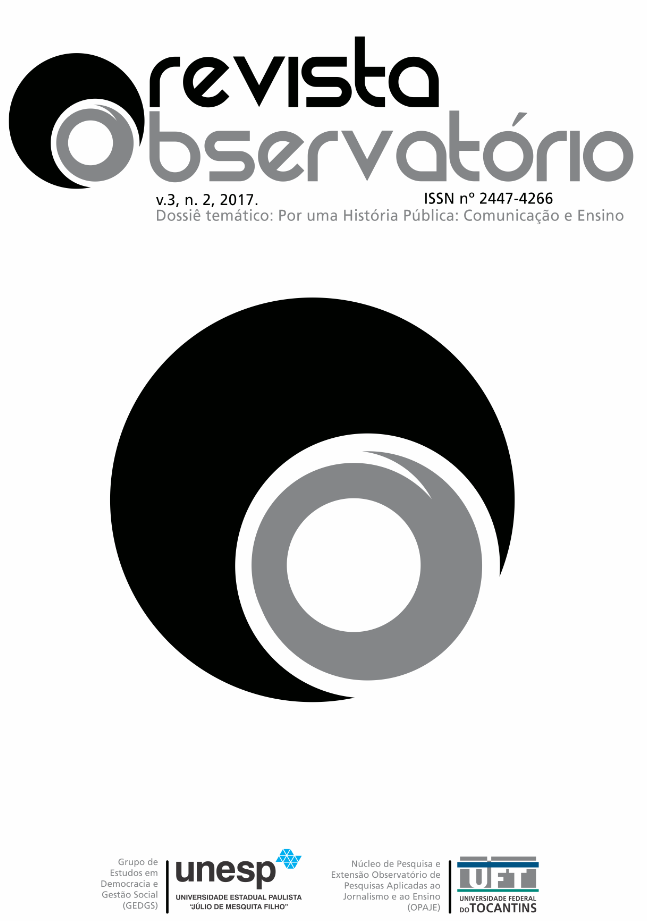Afro-Brazilians at the Museu Paranaense: silences, public demands and resignifications
DOI:
https://doi.org/10.20873/uft.2447-4266.2017v3n2p113Keywords:
Paraná History, Public History, Teaching of History, slavery, post-abolitionAbstract
Motivated by the interest to reflect on the relation of the public with the past and on the construction of past narratives destined to a great public, this article is inserted in the realm of which has been designated as Public History. In this article, we approach the manner the Afro-Brazilian population has been represented at the Museu Parnanense, an institution for memory preservation in the city of Curitiba. As this entity has a strong educational action at the local schools, the article also has a constituted relation with the Teaching of History. Our aim is to demonstrate that, having been created to forge a Paraná identity, which is strongly branded by the appraisal of the history of European immigration, the museum has been silent about the presence of Negrões in the population formation of the region, vanishing or limiting the approach of slavery experiences and the post-abolition period in the local history. Although this characteristic still remains in the exhibition Circuit of the museum, the institution is now seeking, attending to social demands from Afro-descendant groups, the historie recomposition until recently established. This article talks about the route of silencing and the challenges for the recomposition of the histories narrated.
Downloads
References
ARAUJO, Ana Lucia. “Local y global: Brasil y la memoria pública de laesclavitud”. In: PENEAU, Marisa. Huellas y legados de La esclavitud em las Américas: Proyecto UNESCO La Tura Del Esclavo. Buenos Aires: Editorial de La Universidad Nacional de Tres de Febrero, 2012, pp. 212-134.
BEGA, Maria Tarcisa Silva. Letras e Política no Paraná: simbolistas e anticlericais na República Velha. Curitiba: Editora UFPR, 2013.
CARNEIRO, Cíntia Braga. O Museu Paranaense e Romário Martins: a busca de uma identidade para o Paraná.Curitiba: SAMP, 2013.
LIMA, Valéria. Uma viagem com Debret. Rio de Janeiro: Zahar, 2004.
MACHADO, Paulo Pinheir.Lideranças do Contestado: a formação e atuação das chefias caboclas (1912-1916). Campinas: Ed. da UNICAMP, 2004.
POLLAK, Michael. Memória, esquecimento, silêncio. Estudos Históricos. Rio de Janeiro, v. 2, n. 3, 1989.
RAMOS, Renê Wagner. A Representação dos Negros no Museu Paranaense.Anais do XV Encontro Regional de História: 100 anos da Guerra do Contestado. ANPUH. Curitiba: UFPR, 2016. Disponível em http://www.encontro2016.pr.anpuh.org/resources/anais/45/1467942565_ARQUIVO_artigoanpuhRenewRamos.pdf
SANTOS, Myrian Sepúlveda dos. Entre o tronco e os Atabaques: a representação do negro nos Museus Brasileiros. Colóquio Internacional: Projeto UNESCO: 50 anos depois. Janeiro de 2004.
SCHWARCZ, Lilia Moritz. O espetáculo das raças. Cientistas, instituições e questão racial no Brasil. 1870-1930. São Paulo: Companhia das Letras, 1993.
ZUBARAN, Maria Angélica e MACHADO, Lisandra Maria Rodrigues. O que se expõe e o que se ensina: representações do negro nos museus do Rio Grande do Sul.Momento, v. 22, n. 1, p. 91-122, jan./jun. 2013.
Downloads
Published
How to Cite
Issue
Section
License
[PT] Autores que publicam nesta revista concordam com os seguintes termos:
1. Autores mantém os direitos autorais e concedem à revista, sem pagamento, o direito de primeira publicação, com o trabalho simultaneamente licenciado sob a Creative Commons Attribution License (CC BY-NC 4.0), permitindo o compartilhamento do trabalho com reconhecimento da autoria do trabalho e publicação inicial nesta revista.
Leia todos os termos dos direitos autorais aqui.

